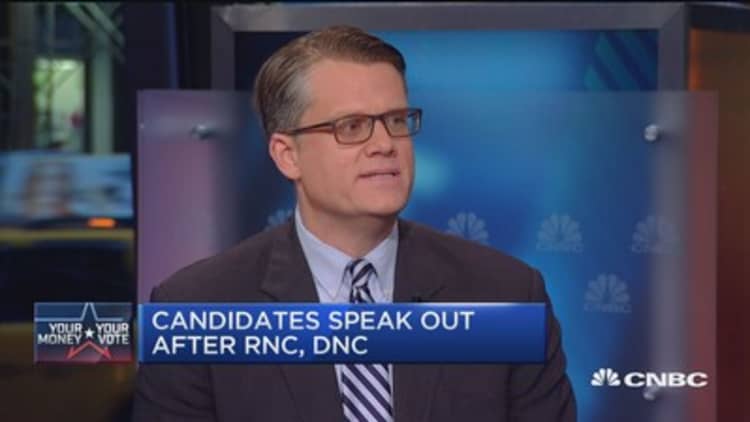
Donald Trump just suffered through a brutal weekend.
He picked a fight with the Muslim-American parents of soldier who died for the U.S. in battle, appeared not to know Russia troops had occupied parts of Ukraine, made up a nonexistent letter about the debate schedule from the NFL and claimed to have rebuffed a meeting request from the billionaire Koch brothers that was never offered.
Oh, and a poll conducted after the Democratic Convention in Philadelphia shows the Republican nominee falling back to 6 points behind Hillary Clinton — about where the race stood before the GOP convention.
The new CBS poll conducted found that 46 percent would vote for Clinton to 39 percent for Trump. The poll also found an electorate that looks fairly stable heading into the final 99 days of the campaign.
Among Trump supporters, 91 percent say their minds are made up. Among Clinton supporters, 92 percent are locked in. That leaves a pool of around 8 percent of undecided voters who could swing either way. Trump would need to win most of these voters to have a chance of reaching 270 electoral votes on Nov. 8. And at the moment, his campaign is not in a position to make that happen.
Take the Khan imbroglio as just one example. Khizr Khan delivered the most emotionally powerful moment of the Democratic convention, ripping Trump as temperamentally unfit for the presidency because he denigrates Muslims, Mexicans and other minorities. Khan, whose son Humayun died in Iraq in 2004, brandished a copy of the Constitution and asked if Trump had ever read it. If Trump's policies were in place, Khan said, his family would never have emigrated from Pakistan.
Instead of acknowledging the family's grief and thanking them for their sacrifice, as Clinton did after being criticized by the parents of a Benghazi victim, Trump slurred the Khan family, suggesting Ghazala Kahn didn't speak at the convention because she wasn't "allowed to" as a Muslim. Ghazala Khan wrote in a Washington Post op-ed that she didn't speak only because she was overcome with grief.
Khizr Khan kept up his assault on Trump over the weekend. "He is a black soul, and this is totally unfit for the leadership of this country," Khan told CNN. "The love and affection that we have received affirms that our grief, that our experience in this country has been correct and positive. The world is receiving us like we have never seen. They have seen the blackness of his character, of his soul."
Trump's comments elicited disavowals from House Speaker Paul Ryan and Senate Majority Leader Mitch McConnell, though neither mentioned Trump by name. Trump's own running mate, Indiana Gov. Mike Pence, issued a statement walking back Trump's comments.
Most of Trump's loyal (and mostly white) base probably won't care about the controversy. But for Trump, the problem is expanding beyond his base to win more moderate Republican voters — especially white women — in places like the suburbs of Philadelphia and Columbus, Ohio. It's conceivable that Trump could run up such astonishing totals among blue-collar white voters in the Rust Belt that he could win without ever changing his message or approach. But it is very unlikely.
Clinton starts with a base of 242 electoral voters in states that are now reliably Democratic. If she wins either Florida or Ohio, the race is over. She could even lose both and still win if she takes a handful of other swing states that look strong for her, including Colorado and Virginia. Trump's path to victory is exceedingly narrow and likely requires him to win Florida, Ohio and Pennsylvania. Florida and Ohio are currently deadlocked; Clinton enjoys a 4 point average lead in Pennsylvania, according to Real Clear Politics.
Trump's comments about Russia and Ukraine are not likely to help him among wavering voters either. The GOP nominee said on ABC's "This Week" on Sunday that if he is elected, Russian President Vladimir Putin "is not going into Ukraine" even though Russia sent troops into Ukraine and Moscow annexed Crimea two years ago. Trump, who recently pleaded with the Russians to release more damaging Democratic emails, also suggested that Crimea is happier under Russian control, repeating Putin talking points rejected by the rest of the Western world.
Voters will not focus on relatively obscure Ukrainian politics. But if Democrats can successfully prosecute the case that Trump is a Putin stooge with dangerously thin knowledge of foreign affairs, they could keep independent voters out of his column. And as of now they will have about a 2-to-1 money advantage to make that argument. The debates will also give Clinton three chances to display a superior knowledge of foreign affairs.
None of this is to say Trump can't win. His support now appears locked in at around 40 percent and Clinton's unfavorability and trustworthiness ratings remain dismal. But if Trump continues to alienate swing voters and shoot from the hip, he could be looking at a stinging defeat.
—Ben White is Politico's chief economic correspondent and a CNBC contributor. He also authors the daily tip sheet Politico Morning Money [politico.com/morningmoney]. Follow him on Twitter @morningmoneyben.


